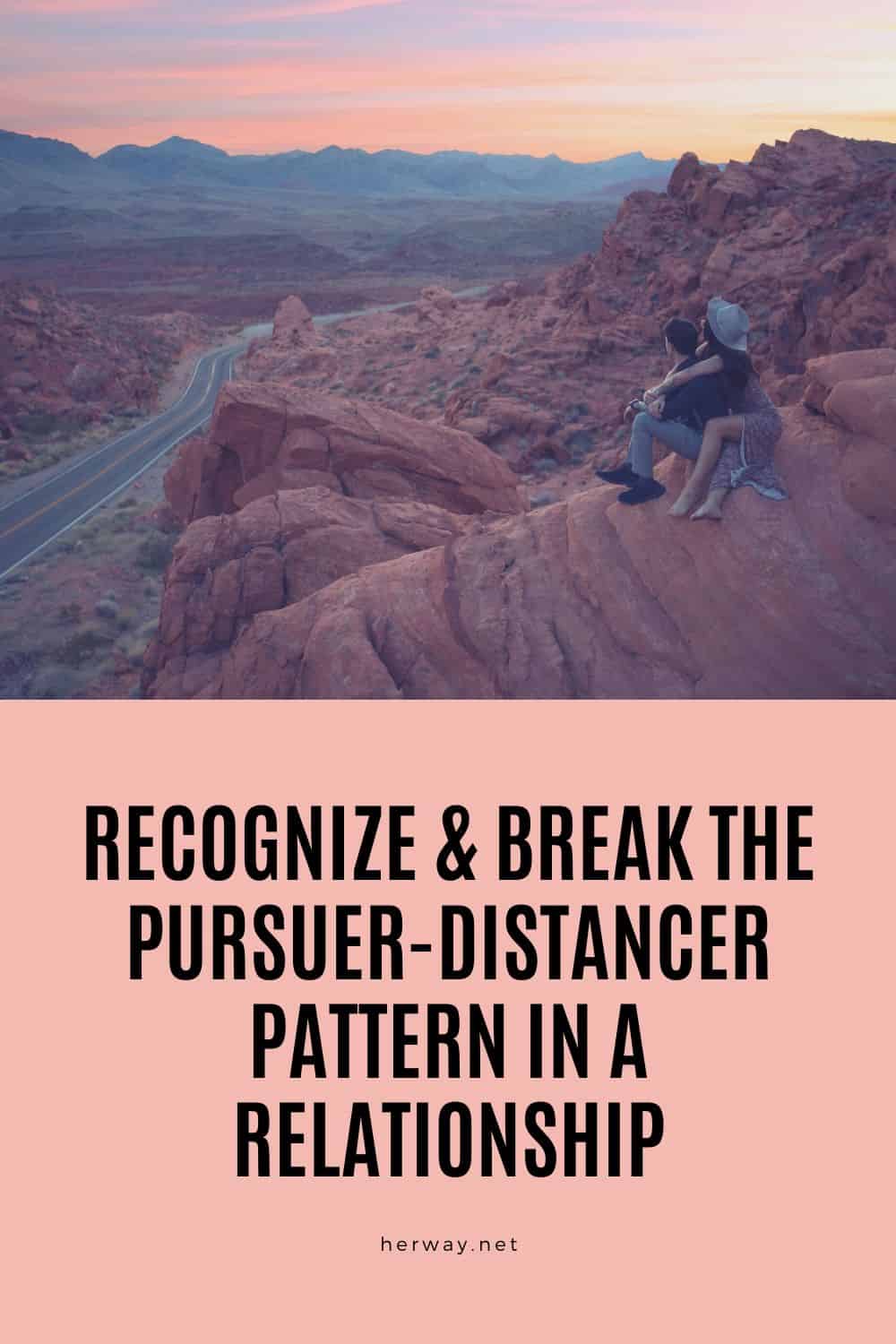Recognize & Break The Pursuer-Distancer Pattern In A Relationship
Have you ever been in a relationship where your partner wanted one thing and you wanted something else? You wanted to be with them 24/7 and they wanted some space and “me” time?
You maybe even had the pursuer-distancer pattern in a relationship and you weren’t even aware of it because you didn’t know such a thing existed.
A pursuer-distancer relationship is one in which there’s a constant struggle between the pursuer’s need for closeness and the distancer’s need for…well, distance.
Let’s imagine the following scenario.
You come home after a long day at work, looking forward to seeing your significant other, and while you are over the moon from emotions, they are overwhelmed and try to escape to another room as soon as possible.
You are left with a feeling of dissatisfaction and wondering what you did wrong, so you follow them, which makes the situation even worse.
Does this sound familiar?
Yes? No?
If your answer is yes, and it’s happened more than once, I am sorry to inform you that you have been or maybe still are dancing the pursuer-distancer dance. What does that mean, you may ask?
Well, while you were seeking attention and quality time together, your partner was seeking some alone time, and space for himself.
Of course, the situation could be the other way around, and you could be the one wanting space, but in this particular scenario, you were the pursuer and your partner was the distance.
How to recognize you’re in a pursuer-distancer relationship

Romantic relationships at their core should be about love, care, and mutual respect, and when you say that you are in one, you should feel happy about it, without any feelings of pressure. Sounds easy, right?
BUT – there’s always a but – it’s easier said than done. Why?
Because every human being, no matter how similar to another, is still an individual and has his or her own needs, own perception of the world, and in the end, own perception of what a relationship should look like.
In a pursuer-distancer relationship, we have two completely opposite sides.
On one end, we have a pursuer who behaves in a way that requires her partner’s full devotion, and on the other, a distancing partner who requires alone time and isn’t able to be devoted to his partner all the time.
So, how do you recognize that you are in such a relationship, and how to make it work in a positive way?
First of all, have you ever felt like your partner is being distant while you feel more connected and share more, even though at first glance everything seems just fine?
Or, have you felt like you need to escape and wish you could just stop everything for a little while?
If one of these two situations touches a chord with you, I am afraid that you might have experienced this exact type of relationship.
What does a pursuer do?

Pursuers seek communication, togetherness, and closeness. Their attachment style is quite anxious. Whenever something happens that triggers negative emotions, they’re quick to try and fix the situation.
On the other hand, the distancing partner has an avoidant attachment style and benefits from separateness.
Some people believe that there’s a basic gender difference recognized in the pursuer-distancer relationship where women tend to be the pursuers and men tend to be distant. Of course, this isn’t always the case.
People in these relationships usually follow a pattern that works like this: A pursuer believes they are the ones who care more and give more to the relationship, and the distance feels like they aren’t being appreciated enough.
The truth is, just because a pursuer has a different attachment style, it doesn’t mean they care more.
The distancer’s behavior doesn’t speak about their affection and love for their partner (or lack thereof), and that’s very important to remember if you plan on fixing things.
How to break the pursuer-distancer dynamic?
In order to break the pursuer-distancer dynamic, there has to be involvement from both partners in a relationship, or consequently, the relationship will not end well.
The reason is very simple. If only one partner is trying and feeling like the major contributor in the relationship, then they might feel that there is a lack of mutual respect.
And no one likes to feel disrespected and neglected.
With that being said, let’s check out what both sides can individually do to improve their relations and to stop the unending pursuer-distancer dance.
The pursuer should:
1. Call off their chase

Whichever way of pursuing your partner is your style, you should stop it. If you’re constantly calling and texting them to make sure they’re in tune with your relationship, you should put an end to it.
If you’re trying to motivate them to approach your relationship the way you do – stop.
Your relationship style probably includes you trying to control your partner’s behavior as much as you can since you’re trying to stop them from making mistakes you expect them to make.
Whichever your pursuit style is, call it off. It’s not your job to handle everything in the relationship. The more you chase them, the more distant they become.
It’s your time to distance yourself.
2. Focus on their own needs

As a pursuer, you’re focused on your partner’s needs instead of your own. One of the most important things you should do in order to break your pattern of pursuing is to shift that focus.
Think about your own emotional needs. Focus on satisfying these instead of trying to fulfill your partner’s needs or pushing them into following the behavior that you believe to be caring, loving, and perceptive.
You can neither expect your partner to fulfill your needs nor invest all your time and energy into fulfilling theirs.
3. Stop pushing and give emotional space

The distancing partner would appreciate relationship dynamics in which they don’t feel chased all the time. They are willing to respond to your requests, but you should strive to be softer in your approach.
You breathing down their neck to give you a response only pushes them further away because it’s too stressful for them – and they tend to flee situations that are too stressful.
If you learn to back off, they’ll feel more like they’re in an emotionally safe environment and will open up to you more freely.
They see themselves as self-reliant and respond best when they don’t feel pursued or pushed.
What you have to do is learn to give them space and stop fearing you’ll lose them.
The distancer should:
1. Make an effort to share their thoughts

Even though it can be difficult and requires some extra effort, you sometimes simply have to understand what your partner needs and give it to them.
How your partner feels must be important to you if you want to be in a happy relationship.
At the end of the day, you need to realize that you are not alone in the relationship. You are one half of it; the other is your partner.
So, in order to make it work, you cannot be a closed book and expect them to always guess what you need and how you feel.
Talk to your partner and reassure them that they are important to you, otherwise they might feel like they are a burden to you.
2. Initiate affection more often

You can’t expect your partner to always be the one who shows affection and think that’s normal.
If you are stonewalling your partner while they are trying to be more close to you, and never initiating affection, you’ll only succeed in making them believe you don’t love them and wonder why you’re even with them.
So, if you want a normal, healthy relationship, you need to show to your partner that you care about them – and not only by telling them now and then, but actually proving it to them in your deeds.
3. Schedule quality time

An intimate relationship – whether it is a 2-month or a 10-year-long marriage – requires some quality time spent with your partner. It is one of the foundational ingredients of every relationship.
It means that without it, your relationship is simply condemned to failure.
By spending time together, you learn about your partner – how they think, what they need – and hopefully you are also enjoying that time, otherwise the whole relationship is pointless.
Therefore, if you don’t want to feel suffocated by your partner’s attention and feel like they are sitting on your shoulders all the time, find the time to devote yourself completely to them, so they don’t feel neglected, and everything should be just fine.
Warning signs of distance in a relationship
Every relationship, regardless of its length and affection, at some moment gets to the point that the partners feel distant from each other.
Sometimes it means that you just need to change certain things and everything will return to normal, but it may also be a sign of something much more serious, such as loss of love.
If you believe your relationship patterns are similar to the pursuer-distancer dynamic we’ve been describing, you might be wondering if there really is any distance between you and your partner.
So, what are the warning signs you should look out for?
1. They no longer care about your little rituals

Wednesday night was always reserved for you two? Sometimes it was a crazy night out, other times it was cuddling on the couch while watching movies, but it was yours.
Now all of a sudden, he has some other plans that don’t include you, and it happens over and over again without any logical explanation.
Or, for example, you used to drink your morning coffee together no matter what, and no way would you fall asleep without your goodnight kiss – that was your relationship pattern from the very beginning.
But now he’s in the habit of skipping those parts of the day for no reason. These little changes are actually quite big and can mean that something is off.
2. You spend less time together

At the beginning of your relationship, you used to spend time together almost every day, and you were able to do it regardless of other obligations, but now you are more distant – not only mentally, but physically.
Of course, it is normal that these things happen. That’s life and certain things are not possible to delay.
However, what’s not normal is that you can see your partner is now not even trying to make time for you; you are the last “thing” on his list of priorities.
3. They change habits

One of the biggest signs that something is out of order is your partner’s change of habits.
If he was the type of guy who used to stay at home during weekends, and now he wants to spend every weekend partying, you can see that he is trying to make some change and that the routine is not working for him anymore, especially if you aren’t invited to those parties.
Also, if you notice that he is more often avoiding things that were normal for your relationship, and deviates from the regular flow of it, something is definitely odd.
4. They keep you separate from family and friends

When people want to distance themselves from someone, they also want their loved ones not to be in any kind of relationship with that person.
So, if you notice that your partner is no longer inviting you to his family reunions or hangouts with friends, but he did before, it is also a sign that he is distant.
The reason behind this change most probably is that he doesn’t feel the need to share every part of his life with you, and friends and family are the most intimate parts of his life.
These are people he cares about and wants on his side.
5. You feel weird around them

When it was all normal, and there was no emotional distance between you, you could sit in the same room for hours without the need to make small talk, because you felt comfortable and it wasn’t awkward.
However, if that is not the case anymore, and you don’t feel like you can be one hundred percent yourself around them – you feel as if you annoy your partner by your mere presence – then there is something wrong in your relationship.
This doesn’t have to mean that you don’t love each other anymore, but definitely that it’s time to talk about what’s wrong and why you’re feeling that way.
6. They’re evasive

Imagine the following situation: Someone asks you where your partner is, or with whom he went out, and you literally have no idea.
Okay, it can happen sometimes, but if you notice that it’s become the norm for him not to tell you these things, then he is certainly pulling back.
He doesn’t feel the need to share the details of his day with you because he doesn’t see you as someone who is close to him anymore.
Maybe he’s sharing with his friends or family, and at some point, you’ve become an extra in that equation.
7. They withdraw intimately

After every crazy day at work, with family or friends, their safe place was with you.
There wasn’t a night in which you did not spend some alone time , cuddling, talking, and sharing those special moments where you felt so close to them.
A partner who distances themselves emotionally is telling you something.
If out of nowhere, their intimate affection has stopped. There are no hugs out of blue or good morning kisses. This can mean that their affection towards you has stopped and the feeling of closeness is lost.
If they don’t feel the need to share those moments anymore, there’s a good chance they are already very distant from you.
Something to think about…

Couples who go through these stages of distancing are at the highest risk of a break-up or divorce. If you believe this risk is already true for you and your partner, you should consider couples counseling .
Your relationship hasn’t necessarily reached a point of no return and that’s something you should remember. Being a pursuer or a distancer has now become who you are.
Even if you break up or divorce, there’s a good chance you’ll be taking this pursuer-distancer relationship pattern into subsequent intimate relationships .
This means that, even in your new relationship or your second marriage , there’s an incredibly high chance you’ll remain who you were in your previous relationship, either as a pursuer or a distancer.
Work on your issues. Willingness to change (on both sides) is key to breaking the negative cycle your relationship functions in right now.
Putting in the effort to change now will make your relationship what it always should have been.
And even if you realize you and your current partner weren’t meant to be, it will help you learn how to maintain healthy relationships in general.
Take a good look at who you are now as a partner, and do the work to be the kind of partner you wish to be.








